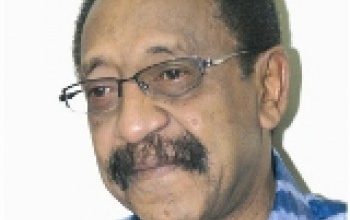Opinion
Audacity

By Dr. Moatasem Aqraa
Notes on Mr. Khalid Silaik’s Post:
1. Acknowledging the Right to Joy:
We thank Mr. Silaik for acknowledging the right of the people of Al-Jazirah to celebrate, and we agree with him. No one can deny them this joy after the statement that the professor granted them this evening.
2. On the Suffering in Al-Jazirah:
Mr. Khalid states that the people of Al-Jazirah endured “all forms of torture and suffering since the Rapid Support Forces (RSF) entered the state at the hands of its soldiers, criminal gangs that wreaked havoc on unarmed civilians, the death bombs raining down on innocents, and the poverty, hunger, and disease that spared no one.”
It is noticeable here that Mr. Khalid attributes the citizens’ suffering to multiple factors, equally or at least without clarifying the relative weight of each. These factors include the RSF militias, independent gangs, the Sudanese army, and the war itself as an abstract cause—akin to Picasso’s Guernica painting, encompassing all aspects of horror.
Some may argue that this distribution of blame serves to justify or mitigate the crimes of the RSF by diluting their responsibility and attributing it to others. However, this judgment is best left to the people of Al-Jazirah, who know best what happened to them. As for me, I am just an observer enjoying the privileges of safety from afar, indulging in pizza and French fries.
3. On Avoiding Vengeance:
We agree with Mr. Khalid’s call for “the armed forces not to be dragged into calls for revenge fueled by various parties against unarmed citizens who remained in Al-Jazirah following the army’s withdrawal, as these people are helpless and have no choice but to adapt to any circumstances they face.”
This is a valid call, and we echo Mr. Khalid’s stance, urging forgiveness for those who collaborated minimally with the RSF for their safety, provided such collaboration did not result in direct and severe harm to other civilians. Necessity knows no blame, but within limits.
4. On the Call for a Professional Army:
We also agree with Mr. Khalid’s call for a state “with a professional, unified, and national army committed to its duties, staying away from interfering in politics.”
We add to our agreement with Mr. Khalid that this point necessitates the immediate condemnation and disbandment of the RSF militia. This militia cannot be integrated into the army after committing atrocities that include some of the worst crimes under international law. Furthermore, allowing them to exist independently in Sudan’s future contradicts Mr. Khalid’s call for a “professional, unified” army.
Can Mr. Khalid call for the RSF’s dissolution now? Or does he prefer a gradual integration over twenty years or ten? Or perhaps he favors leaving the matter indefinitely, giving the RSF time to regroup and expand its sphere of influence through bribery of politicians and writers?
5. Final Remarks:
Despite our disagreements here and there, we commend Mr. Khalid’s commitment to consistently addressing public opinion. Anyone aspiring to lead Sudan must engage with the public regularly, take clear stances on difficult issues, and this is what Mr. Khalid has been doing since his struggle against the Bashir regime when we stood with him in solidarity and admiration.
Mr. Khalid’s media presence is far more honorable than the likes of “Hamad Labad,” who claim to represent the Sudanese people but never address them, listen to them, or take any risks. Such behavior is cowardly and disgraceful. These individuals want power without getting their hands dirty in the alleys of struggle, unlike Mr. Khalid, who bravely engages (as we do).
Mr. Khalid ensures his opinions are documented in history, holding himself accountable for them. This reflects courage, clarity, and fairness, as he provides his opponents with material to evaluate his role and scrutinize the consistency of his words and actions.
Disagreements with Mr. Silaik are inevitable, but no one can accuse him of cowardice or employing the “Hamad Labad” tactics. He does not shy away from boldly expressing his views, which some may perceive as audacious. However, in politics, what one sees as boldness, another may see as audacity.
We, too, often find our opinions deemed audacious, and that’s perfectly fine—just like yogurt.



